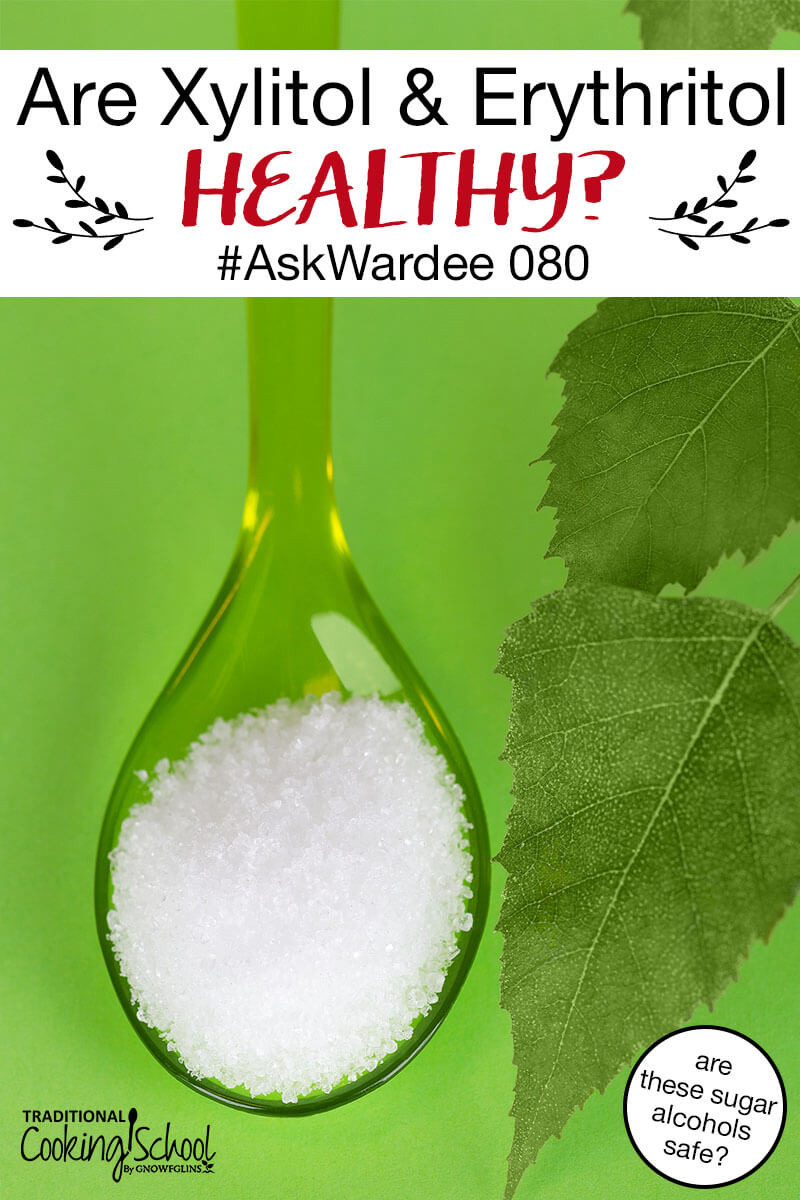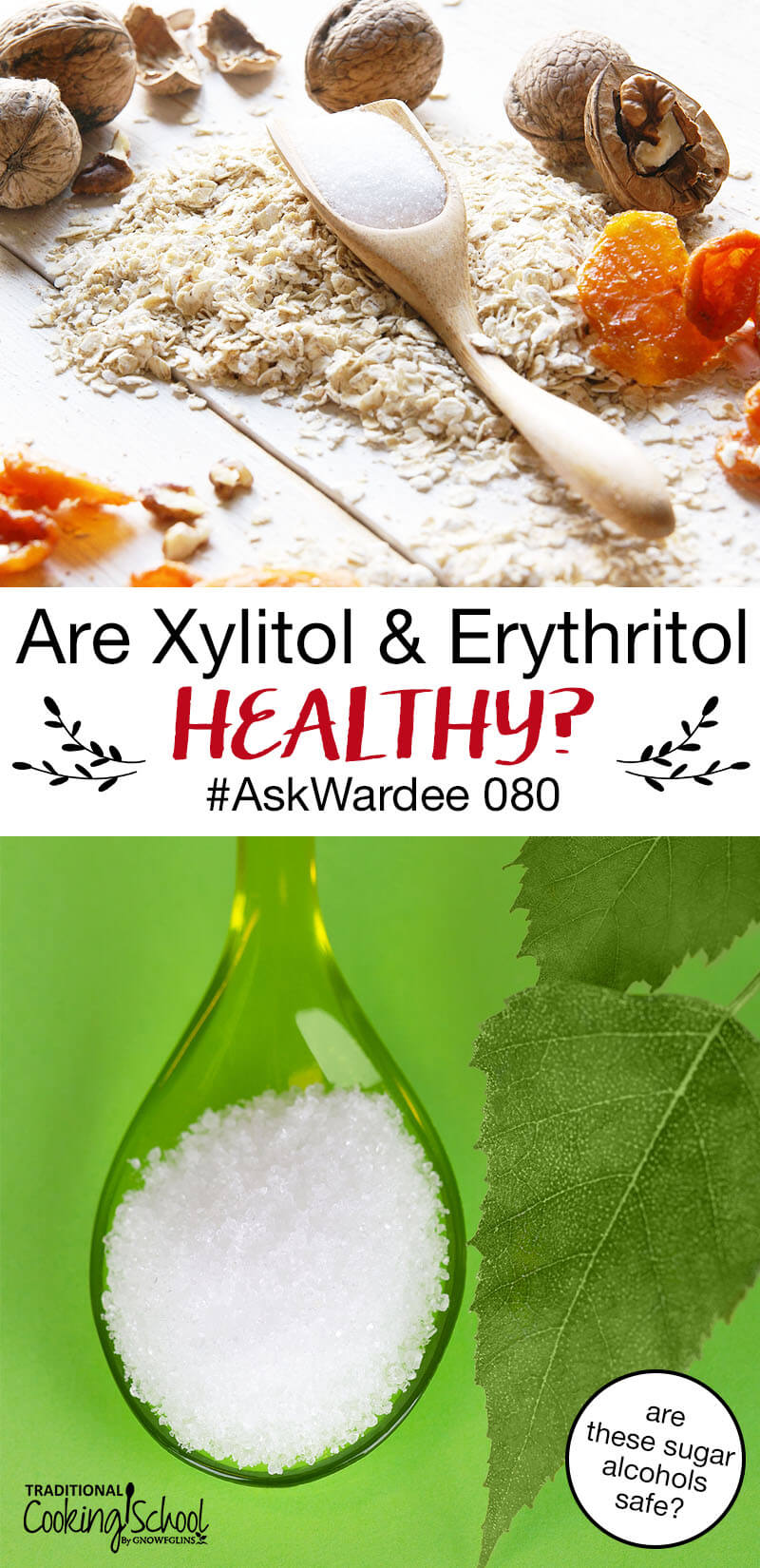
You know you shouldn’t be eating sugar and you know the artificial sweeteners like aspartame are no good, either…
Yet, all these health foods, health blogs, and health experts talk about xylitol and erythritol as safe alternative natural sweeteners.
Are these “sugar alcohols” healthy? Are they good for you? Are they even natural?
Should we be eating them?
Could they possibly be the answer to being able to eat sweets even when you’re off sugar?
That’s what we’re discussing in today’s #AskWardee. 🙂
I broadcast #AskWardee live each Wednesday at 10am Pacific (1pm Eastern) on Periscope and Facebook Live. Both the podcast and video replay of this week’s show are below. Enjoy!
Subscribe to #AskWardee on iTunes, Stitcher, YouTube, or the Podcasts app.
The Question: Are Xylitol And Erythritol Healthy?
Macey D. asks:
I love your story of losing 30 pounds in a year combining Trim Healthy Mama with Traditional Foods. I know you said you basically didn’t eat sweets much (only dark chocolate) and sweetened your drinks with stevia. What did you do for birthdays or holidays, though? Did you ever use xylitol or erythritol? Are they healthy? I know I should give up sweets for the most part, but I don’t know what to do about special occasions when stevia won’t work but I can substitute one of the sugar alcohols cup for cup in my “before” recipes. I am eager to hear what you think. Thank you so much.
Table Of Contents
Are Xylitol And Erythritol Healthy? My Answer
I shared in this podcast If I Were Starting Trim Healthy Mama With Traditional Foods Over Again… that all I need for dessert is dark chocolate. 🙂 Here’s what I said:
I can have a great E or S meal, followed up by 2 squares of very dark chocolate.
A note about xylitol or erythritol as THM sweeteners. A case can be made that these can be helpful in a healing journey. Like what if someone is allergic to stevia (the sweet tasting herb) and needs a little sweet to keep them happy on the healing journey? Use these sugar alcohols sparingly without guilt.
If you’re going to use xylitol or erythritol, make sure it’s non-GMO (because otherwise, it’s most likely derived from corn). Also, I personally would choose erythritol over xylitol because 1) I get bad cramping and digestive upset from xylitol and 2) erythritol is fermented and more easily handled by the body and small intestine (source).
So, that’s my very simple answer, and it hasn’t changed. Let’s go a bit more in depth now, though…
…because even though 99% of the time I only use stevia, like Macey, there are special occasions where I will pull out the erythritol so we can have cookies, a cake, or other dessert without consuming table sugar or other sugars that will affect blood sugar and weight gain.
These are the moments that are really important emotionally. Because when you’re on a healing journey, I think it’s important to enjoy what you’re eating. And a treat every month or so (or every week or so) can really help someone endure the rest.
What Are Sugar Alcohols?
Xylitol and erythritol are sugar alcohols, which means:
Also known as polyols, sugar alcohols get their name because part of their chemical structure resembles sugar and part resembles alcohol. They are basically hybrids of sugar molecules and alcohol molecules. Polyols occur naturally in plants, like apples and pears, and vegetables.
Sugar alcohols are used as sugar substitutes because they look and taste very much like white sugar, but they contain much fewer carbohydrates than sugar.
They provide sweetness without raising the blood sugar, so they are considered safe for diabetics and people with blood sugar problems, including insulin resistance and hypoglycemia.
This is a quote from my friend Lindsey Dietz’s FREE Guide to Alternative Sweeteners. You should definitely click here to download the FREE guide; it’s pictured above.
Are Xylitol And Erythritol Natural?
Polyols occur naturally in plants like apples and pears and vegetables. So yes, the sugar alcohols are natural.
It’s the processing to extract them into a pure powdered form which is arguably not natural because it doesn’t happen in nature or in a normal kitchen. This doesn’t necessarily mean it’s all bad, though, in my opinion. We need to know the particulars of the processing… (that’s coming up).
In addition, sugar alcohols in conventional processed foods are often extracted from genetically modified corn. (So it’s really important to source non-GMO sugar alcohols.)
Are Sugar Alcohols Safe?
Although they are generally considered safe, there are certain individuals who shouldn’t consume sugar alcohols. Here are just a few contraindications (you’ll find more in the FREE Guide to Alternative Sweeteners):
- You have severe digestive issues such as IBS — “Sugar alcohols aren’t totally absorbed during digestion, so they ferment in the intestines. The fermentation produces gas, which may build up and result in bloating, flatulence, or discomfort.” —from Lindsey’s FREE Guide to Alternative Sweeteners
- Dogs live with you — xylitol is extremely toxic to dogs while the other sugar alcohols appear to be safe. Be on the safe side and don’t have them around or keep them well out of reach!
- You are addicted to sweets — continuing to eat sweets even prepared with sugar alcohols will not break a sugar addiction.
- You’re sensitive to corn — while xylitol can be derived from white birch or corn, erythritol is produced by fermenting corn.
Xylitol vs. Erythritol
While both xylitol and erythritol can cause symptoms of indigestion when consumed in large amounts, xylitol can do so even more due to its larger molecule size. This is just one reason why, if sugar alcohols are going to be consumed, I prefer erythritol over xylitol.
Plus, erythritol is extracted through fermentation, not sugar hydrogenation (like xylitol is). I prefer fermentation because it’s more natural.
So unless a corn sensitivity is an issue (and always get non-GMO sugar alcohols no matter what!), erythritol is the preferred sugar alcohol for many reasons.
In my opinion. 🙂
When Would Someone Use Sugar Alcohols?
As I’ve said before, people that are on healing diets (even healthy weight loss diets like Trim Healthy Mama — here’s my story and here’s my FREE 1-week “purist” traditional food+THM menu plan) need occasional treats.
Special occasions or to break the monotony — that’s how I personally approach use of sugar alcohols.
Every few months, on a holy-day or birthday, I bake a treat using non-GMO erythritol. We all enjoy it very much, and we eat it in moderation.
You can also purchase these no-sugar chocolate chips from Trim Healthy Mama. They are sweetened with stevia and erythritol and contain none of the fillers that other stevia-sweetened chips contain (so they don’t upset your stomach).
Are Xylitol And Erythritol Healthy?
Well… eating less sugar is nearly always a good thing, right? In my opinion, cutting back on sugar and replacing it with sugar alcohols (and/or stevia) now and then can be part of a healthy diet.
Natural dental products use minimal amounts of sugar alcohols and you generally don’t swallow them, so there’s not much reason for concern there.
Consuming in foods, though… No sugar alcohol should be eaten in large quantities. The number I’ve seen for erythritol for adults is no more than 50 grams (or 3.5 tablespoons) at one sitting. For children, it’s even less. Otherwise, headaches, indigestion, or diarrhea can result.
It’s that moderation thing rearing its head again! 😉
Where To Buy Erythritol
The best and most affordable non-GMO erythritol choices are:
- Trim Healthy Mama (check it out here)
- Anthonys’ (check it out here)
Trim Healthy Mama also offers this pre-mixed blend of erythritol and stevia together. It’s very handy to use in baking (use half as much as you would white sugar).
How To Use Erythritol In Your Baking
I most often whizz erythritol in my Vitamix to make it more fine, like a powdered sugar. It mixes in and dissolves much better in recipes.
Simply substitute it cup-for-cup for white sugar (or other dry sweeteners) in your recipes. However…
Erythritol is less sweet than sugar, so using it cup for cup (unless the original recipe is super sweet) may not be sweet enough. Yet, it has the same bulk as white sugar and shouldn’t always be increased — unless it’s a recipe where bulk doesn’t matter.
If you can’t increase the amount, you have 2 options:
- Combine it with the herb stevia — 1 cup of erythritol + 1/2 to 1 teaspoon powdered stevia — and then use cup for cup
- Use this pre-mixed blend of erythritol and stevia together — and then use 1/2 cup of this for every 1 cup sugar
- Just leave it as is and go with a less sweet treat! This works more often than not. 🙂
Nourishing Recipes Using Erythritol
While there are lots of low-carb recipes on the web using xylitol or erythritol, the other ingredients are not necessarily nourishing, whole foods, or allergy-friendly. The recipes are pretty scary, actually!
Or, they require a lot of substituting to make them work with a whole foods diet.
Which is why I’m thrilled to introduce you to…
40% OFF — Sweet Without Sugar eCookbook: A Collection Of Nourishing Allergy-Friendly Low Carb Desserts
If you want nourishing, no-sugar recipes for those special occasions, and you’re ok with using erythritol now and then, you’ve got to check out my friend Lindsey’s brand-new eCookbook, Sweet Without Sugar. (Lindsey is our content director here, by the way…)
The Sweet Without Sugar eCookbook contains 59 original recipes for cheesecakes, tarts, curds, pies, cakes, ice cream, brownies and more using nourishing ingredients like butter, coconut oil, eggs, gelatin, and collagen. It’s high fat, high protein, low-carb, THM-friendly, Paleo or Primal, and allergy-friendly. And… it’s currently on sale for 40% off!
Get more info or buy now here…
We absolutely love these recipes. The fun part? Because we eat treats only occasionally, these 59 recipes (plus a bonus free recipe… see below) will last us for years to come! Literally! 😉

If you purchase the Sweet Without Sugar eCookbook through this link, I’ll throw in a sugar-free recipe of my own — Sugar-Free REAL ice cream (pictured above). Just forward me your receipt from Lindsey and I’ll reply with my recipe! (Forward to wardee at traditionalcookingschool dot com.)
Want a FREE Recipe From The eCookbook?
For today’s #AskWardee, I prepared these Sugar-Free Chocolate-Dipped Shortbread Cookies from the Sweet Without Sugar eCookbook.
They’re THM:S, grain-free, sugar-free, and low-carb. Oh, and they’re totally yummy! The whole family loved them and my husband, in particular, said they are really satisfying cookies!
You can get the recipe FREE here because Lindsey has generously allowed me to share it with all of you! Thank you, Lindsey!
Helpful Links:
- FREE Guide to Alternative Sweeteners (FREE instant download)
- 40% OFF & BRAND-NEW! Sweet Without Sugar eCookbook (currently 40% off!)
- Sugar-Free Chocolate-Dipped Shortbread Cookies (FREE recipe from the new Sweet Without Sugar eCookbook!)
- Keto Lemon Poppyseed Bundt Cake {grain-free, dairy-free, THM:S}
- How I Lost More Than 30 Pounds In 1 Year (my Trim Healthy Mama story)
- FREE 1-Week Traditional Food + THM Menu Plan
- Where to buy non-GMO erythritol
- stevia (the brand I prefer)
- Vitamix — for whizzing the erythritol until it’s a fine powder
Do you use sugar alcohols such as erythritol? Why or why not?
...without giving up the foods you love or spending all day in the kitchen!

2 free books:
Eat God's Way
Ditch the Standard American Diet, get healthier & happier, and save money on groceries...
We only recommend products and services we wholeheartedly endorse. This post may contain special links through which we earn a small commission if you make a purchase (though your price is the same).






I use the sugar alcohol and do THM and I am down 25 pounds AND 3 dress sizes since January ! And I’ve never ate better !
I do use stevia by itself for cheese cake, sweetening my tea, puddings and the Payday candies. For chocolate treats I make my own blend of sweetner using NOW erthritol (organic) and birch processed Xylitol and stevia.
For me ? The health BENEFITS of these out weigh (literally!) The RISKS of using sugar and remaining overweight with high blood sugar and crazy hormones .
A girls gotta do something !
Love you Purist gals btw ! Keep it coming !
Hi Genet,
So glad you’ve found a method to sweeten foods that works for you! 🙂
God bless you,
~ Danielle, TCS Customer Success Team
Hi there. Please please I don’t want to burst anyone’s bubble, to all you who’ve found help with THM. Only want to caution that young children can be very affected by xylitol as a neurotoxin. Ive experienced this twice with my children when we were visiting a friend who uses it…. severe reactions which I later surmised was probably just that. Probably some children are more affected than others . Selma
Hi, Selma and thank you for pointing this out about xylitol. I’m sorry your little ones had such a severe reaction. 🙁
On a positive side for xylitol…we started using it for our little one who was advised to have surgery to fix decaying teeth. Together with fluoride varnish, it has hardened teeth to prevent such severe work. I know neither xylitol nor fluoride varnish are ideal…but neither is surgery and a mouth full of crowns before your third birthday! We have changed to a traditional diet now and that helps, but we are still thankful for the dental benefits of a teaspoon of xylitol a day spread out over many dosages. And now at almost age eight, she has a mouth full of healthy teeth and strong adult teeth coming in.
Hi Julie,
Thanks for sharing your story!
So glad your daughter has a mouth full of healthy teeth. 🙂
~Danielle, TCS Customer Success Team
Hi Mary,
Once you purchase the book you’ll receive and email receipt from Lindsey at Today In Dietzville.
Please forward that email to wardee (at) traditionalcookingschool (dot) com.
Thanks!
~Danielle, TCS Customer Success Team
I tried and it didn’t work. Won’t recognize the email.
Hi Mary,
Sorry for the confusion.
Did you replace that (at) with an @ and the (dot) with a . ?
It’s common to type out an email address in that way so spam bots can’t detect it. 🙂
~Danielle, TCS Customer Success Team
Yes, I tried several ways. It’s no big deal. I make ice cream all the time, was just curious if it was like mine. Thanks.
Wouldn’t monk fruit (Julian’s Bakery has an organic pure monk fruit–nothing added) be a better option?
Hi Krissy,
Wardee doesn’t know enough about monk fruit to comment. She is planning to explore it more soon. We’ll let you know when we have more information/thoughts. 🙂
Millie, TCS Customer Success Team
I cannot use any of the sugar alcohols as I have severe explosive diarrhea. Sorry to be so descriptive, but I’m sure that I’m not the only person who is so affected. I find Stevia to be extremely bitter. Slenda, on the other hand, works great for me, despite some negative press.
Thanks, Wardee for all your help.
Diana
I don’t use any sugar alcohols because they all cause me digestive upset: gas, bloating, diarrhea. I find it hard to believe that anything that causes such a reaction is healthy for you and must be disturbing your microbiome among other things, and so can affect more than just digestion.
I’ve been eating keto the past 3 years for health reasons. For me (and my family) the best sweetener option when making keto sweets is mixing allulose, erythritol, xylitol, monk fruit & stevia. Any of the 5 alone is a no-go for us because of either digestion or taste issues. Because keto recipes are higher in fat (so richer tasting), they don’t need as much sweet to taste good. Other than that, a good dark chocolate with minimal sugar (as Wardee mentioned) is also a great option! 🙂 But since we like a bit a variety, … 🙂